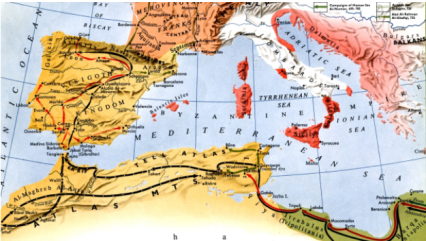 A few weeks ago, I wrote about the connections between Arabic and my mother tongue, Hindi. Today, I thought it would be fun to talk about the links between Arabic and the Romance languages, especially Spanish.
A few weeks ago, I wrote about the connections between Arabic and my mother tongue, Hindi. Today, I thought it would be fun to talk about the links between Arabic and the Romance languages, especially Spanish.
There is an extensive history of the Arabic influence on Spanish, due to the Islamic conquest of the Iberian Peninsula in the Post-Classical Era. When the Arabs took over the region, their vocabulary penetrated deeply into the dialect of Vulgar Latin spoken in the area, which we now know as Spanish. Ranging from architecture, recreation, war, science, clothing, and politics, the influence of Arabic on Spanish is immense. In fact, not only does 8% of Spanish vocabulary come from Arabic, conversational phrases have also transferred over. For example, the Spanish phrase, “Ojalá”, or “God willing”, comes from the Arabic term “إن شاء الله (Inshallah)”, which has the same meaning. I could write an entire research paper about this, but I’ve already done that in World History this year, so I would rather focus on something else.
When analyzing Spanish/Arabic cognates, I was struck with a sudden curiosity: what if the influence that Arabic had on Spanish was not limited to just Spanish, but to Romance languages as a whole! So, I decided to do some research, and the results were pretty fascinating!
In this table, I have written some examples in English, Arabic, Latin (the root of Romance languages), and the five main Romance languages.
| English | Arabic | Latin | Spanish | French | Italian | Portuguese | Romanian |
| Blouse | بلوزة
(Bluza) |
Blouse | Blusa | Chemisier | Camicetta | Blusa | Bluză
|
| Pants | بنطلون
(Bantalun) |
Braccae | Pantalones | Pantalon | Calças | Pantaloni | Pantaloni |
| Shirt | قميص
(Qamis) |
Shirt | Camisa | Chemise | Camicia | Camisa | Cămaşă
|
| Sugar | سكر
(Sukkar) |
Saccharo | Azúcar | Sucre | Zucchero | Açúcar | Zahăr |
| Guitar | قيثارة
(Qithara) |
Guitar | Guitarra | Guitare | Chitarra | Violão | Chitară
|
| Music | موسيقى
(Musiqa) |
Music | Música | Musique | Musica | Música | Muzică |
What I found most interesting was the fact that in a few of the cases, the Romance words shared a common root not with their ancestor, Latin, but with the external input of Arabic. I also found that many of the similarities had to do with words associated with clothing. Perhaps it has something to do with international trade in the Middle Ages… that will take some more research!
Sounds like a great EE topic……and PhD dissertation! ❤
LikeLike
Very informative. So much similarity, cannot imagine.
LikeLike
Haha! I don’t know about the PHD quite yet, but I definitely want to do my Extended Essay about a sociolinguistics topic! I am currently looking into the presence and role of French in Morocco, Algeria, and Tunisia, where Arabic is the main language. So many choices!
LikeLike
Thank you, Nani. Just like you and me! 😀
LikeLike
The information is really interesting
LikeLike